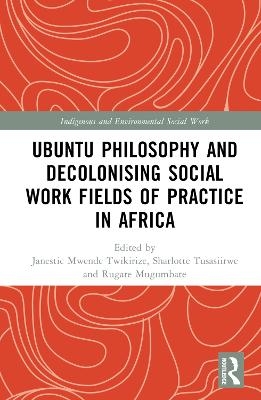
Ubuntu Philosophy and Decolonising Social Work Fields of Practice in Africa
Routledge (Verlag)
978-1-032-36126-0 (ISBN)
It is within this context that the ubuntu philosophy has gained traction. There is increasing consensus that Ubuntu as an African philosophy and way of life, has the potential to be used as a decolonising framework for social work education and practice. Theorising from Ubuntu can influence and be the foundation for African social work theory and knowledge, social work values and ethics, social work research and policy, and Ubuntu informing different fields of social work practice like social work with older people, children and young people, ubuntu and poverty alleviation, ubuntu and the environment, among others.
Drawing together social workers engaged in education, research, policy, practice, to theorise Ubuntu and its tenets, philosophies, and values, this book shows how it can be a foundation for a decolonised, more relevant social work education and practice in African contexts.
Janestic Mwende Twikirize (PhD) is an Associate Professor of Social Work at Makerere University, Uganda. She holds a PhD in Social Work and Social Development. Dr Twikirize served as the Vice President of the Association of Schools of Social Work in Africa (ASSWA) and as a board member of the International Association of Schools of Social Work (IASSW) from 2012 to 2018. Her research with local communities and at the same time her international exposure to various philosophies and discourses in social development led her to pick interest in indigenisation and decoloniality of education and practice. Sharlotte Tusasiirwe (PhD) is an Indigenous African tracing her ancestry from the Basingo clan of Banyankore/Bakiiga/Bahororo tribe of Western Uganda, East of Africa. Sharlotte has been researching and publishing in the area of decolonising social work and she is passionate about seeing culturally appropriate and respectful social work around the world. She is currently a social work lecturer at Western Sydney University, and she is interested in areas of Community-led initiatives and development; African spirituality; Indigenous epistemologies; international social work, among others. Rugare Mugumbate (PhD) is a Zimbabwean social worker who trained at the School of Social Work, University of Zimbabwe and worked at the Epilepsy Support Foundation and the Bindura University of Science Education (BUSE) in Zimbabwe between 2003 and 2015. Among other study areas, his work centers on valuing and using African knowledge such as Ubuntu philosophy in teaching, learning, practice, and research. Presently, he is a lecturer in the School of Health and Society, University of Wollongong, Australia and a Senior Research Associate, Department of Social Work & Community Development, University of Johannesburg, South Africa.
Part I: Theoretical Perspectives - Ubuntu and Decolonising Social Work. 1.Decolonising social work fields of practice: An introduction. 2.Ubuntu: an overview. 3.Ubuntu in international social work. Part II: Ubuntu and Decolonising Social Work Ethics and Fieldwork. 4.Ubuntu and decolonising Biestek’s (1957) seven principles of the casework relationship. 5.Ubuntu principles: unethically ethical? Decolonising social work values and ethics in Social Work practice and research. 6.Decolonizing Social Work Fieldwork Education in Africa: Approaches, Challenges, and Prospects. Part III: Ubuntu and Social Work with Families. 7.Ubuntu Social Work with Individuals and Families: A Process Model. 8.Collective Child Rearing in Igboland as a Panacea to Juvenile Delinquency: A Philosophical Analysis. 9.Ubuntu in Gerontological Social Work: A community-led care model. 10.Community solidarity and intergenerational relationships in the care of older people in Africa. 11.Philosophies guiding the model of care for older adults in the traditional Igbo society, southeast Nigeria: A guide for social work decolonization agenda. Part IV: Ubuntu and Environmental Social Work. 12.The Efficacy of Ubuntu on Environmental Social Work in Africa. 13.Leveraging Ubuntu philosophy as a vehicle for promoting environmental justice in Zimbabwe. 14.Enhancing Environmental Conditions of Slum Settlement Dwellers in Africa: Putting Ubuntu and Community Social Work into Perspective. 15.Ubuntu and social work in emergencies: Opportunities for community-based disaster risk management in Zimbabwe. Part V: Ubuntu and Other Fields of Practice. 16.Ubuntu-informed approaches for addressing Conflict-Related Sexual Violence (CRSV): Scope, rationale, and implications for Social Work. 17.Towards Decolonisation of Social Work Practice in Response to the Drug Abuse Problem in Africa. 18.Ubuntu philosophy and sexual behaviours in Zimbabwe: Implications for social work. 19."Agbajo Owo La Fin Soya Ajeji Owo Kan Ko Gbe Eru De Ori": A Social Work Perspective on the Collective Action of the End SARS Protest in Nigeria. Part VI: Looking Ahead. 20.Ubuntu inspired tools and models to decolonise social work practice. 21.Conclusions: Furthering decolonising social work in Africa.
| Erscheinungsdatum | 26.10.2023 |
|---|---|
| Reihe/Serie | Indigenous and Environmental Social Work |
| Zusatzinfo | 13 Tables, black and white; 10 Line drawings, black and white; 10 Illustrations, black and white |
| Verlagsort | London |
| Sprache | englisch |
| Maße | 156 x 234 mm |
| Gewicht | 740 g |
| Themenwelt | Geisteswissenschaften ► Religion / Theologie |
| Naturwissenschaften ► Geowissenschaften ► Geografie / Kartografie | |
| Sozialwissenschaften ► Pädagogik ► Sozialpädagogik | |
| Sozialwissenschaften ► Soziologie ► Makrosoziologie | |
| Sozialwissenschaften ► Soziologie ► Spezielle Soziologien | |
| ISBN-10 | 1-032-36126-3 / 1032361263 |
| ISBN-13 | 978-1-032-36126-0 / 9781032361260 |
| Zustand | Neuware |
| Informationen gemäß Produktsicherheitsverordnung (GPSR) | |
| Haben Sie eine Frage zum Produkt? |
aus dem Bereich


